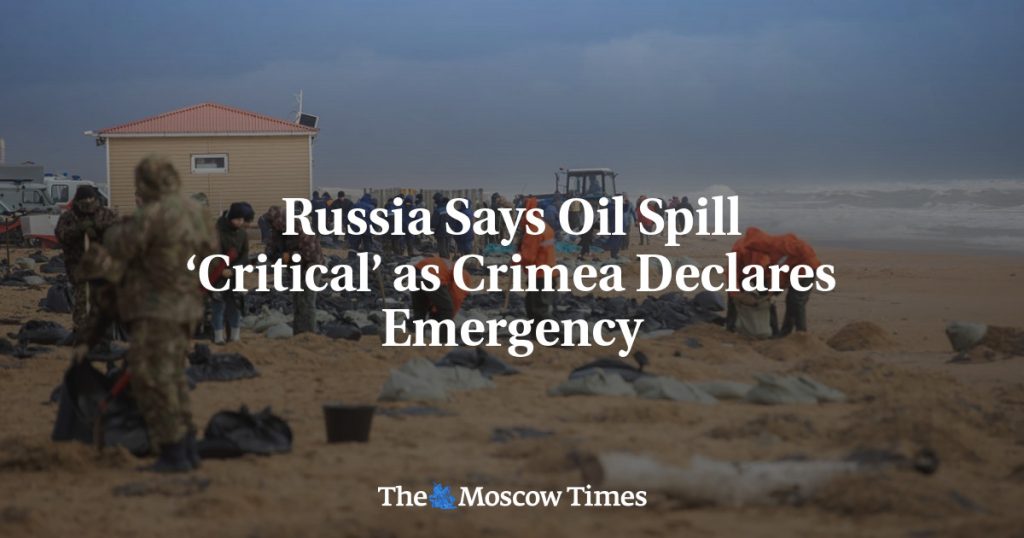A severe environmental disaster occurred in the Black Sea when two tankers collided near Crimea, resulting in a massive oil spill. The incident took place on December 15 in the Kerch Strait between Russia and the annexed Crimean peninsula. One tanker sank, while the other ran aground, spilling approximately 40 percent of the 9,200 tonnes of fuel oil they were carrying into the sea. The situation has been deemed critical by Russian officials, with thousands of volunteers mobilized for cleanup efforts that have been criticized as insufficient by some scientists. The Kremlin has acknowledged the seriousness of the situation, stating that it is challenging to assess the full extent of the environmental damage at this time.
Following the oil spill, the governor of Crimea, Sergei Aksionov declared a state of emergency due to the contamination of oil products in the Kerch Strait. The Russian transport ministry has claimed that all polluted areas have been cleaned, and no recurring pollution has been detected. However, Emergency Situations Minister Alexander Kurenkov has indicated that the threat of additional fuel leaks in the Black Sea and spills on the coast remains. President Vladimir Putin has described the oil spill as an ecological disaster, highlighting the gravity of the situation and the need for urgent action to mitigate the environmental impact of the incident.
The cleanup operations in response to the oil spill have been the subject of scrutiny, with some Russian scientists expressing concerns about the adequacy of the measures taken. The scale of the pollution presents a significant challenge for addressing the environmental damage caused by the spill. Experts are working to assess the extent of the impact on the marine ecosystem and wildlife in the affected area. The spill has raised awareness about the risks associated with transporting oil in sensitive marine environments and the importance of implementing effective prevention and response measures to mitigate such disasters.
Despite efforts to address the oil spill and minimize its impact, the Russian government faces criticism for its handling of the environmental disaster. The inadequate response to the crisis has prompted concerns about the long-term consequences for the Black Sea ecosystem and local communities that rely on the marine environment for their livelihoods. The incident serves as a stark reminder of the risks associated with oil transportation and the need for improved regulations and preparedness to prevent similar disasters in the future. It underscores the importance of international cooperation in addressing environmental emergencies and protecting vulnerable ecosystems from the harmful effects of pollution.
The oil spill in the Black Sea has prompted calls for greater accountability and transparency in the transportation of hazardous materials to prevent similar incidents in the future. Government officials and industry stakeholders have a responsibility to prioritize environmental protection and safety measures to avoid catastrophic consequences for the marine environment and coastal communities. The incident serves as a wake-up call for policymakers and regulators to strengthen regulations and enforcement mechanisms to reduce the risk of oil spills and other environmental disasters. Concerted efforts are needed to prevent and mitigate the impact of such incidents on fragile ecosystems and biodiversity in marine environments.
In conclusion, the oil spill in the Black Sea has highlighted the urgent need for enhanced environmental protection measures and emergency response capabilities to address the devastating impact of oil spills on marine ecosystems. The incident underscores the importance of proactive measures to prevent oil spills and mitigate their consequences through coordinated efforts by governments, industry stakeholders, and local communities. The urgent response to the crisis in the Black Sea serves as a reminder of the inherent risks associated with oil transportation and the imperative of ensuring robust safety protocols to prevent environmental disasters. The incident should prompt a reevaluation of existing practices and policies to enhance the resilience of marine ecosystems and minimize the potential for future environmental harm.















